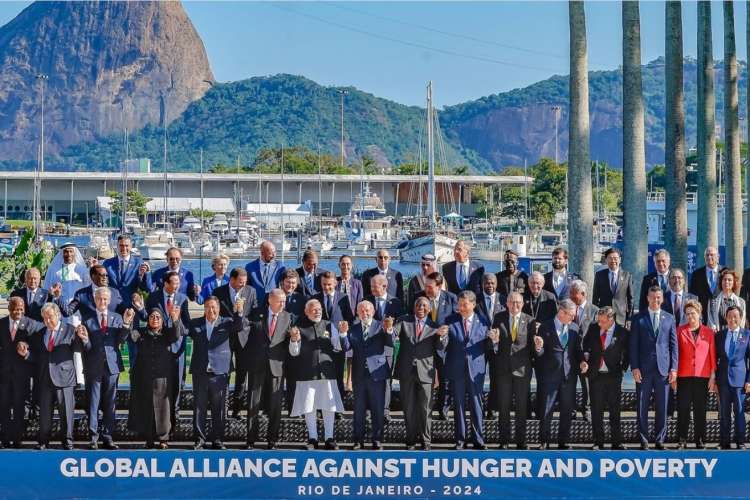The G20 Brazil Summit under the leadership of President Luiz Inácio Lula da Silva sought to address critical issues such as climate change, poverty alleviation, and global governance, but without much success. Held in Rio de Janeiro, the summit was marked by lofty goals, some key achievements, and significant shortcomings.
President Lula emphasised the need for G20 nations to accelerate their climate neutrality targets, suggesting deadlines of 2040 or 2045 instead of 2050. This bold call underlined the urgency required to combat what he called “the world’s warmest year on record.” The joint statement from the summit reflected this urgency, committing to substantially increasing climate finance from billions to trillions of dollars.
READ | Rising interest rates threaten to derail India’s growth prospects
Focus on climate change, hunger
While the statement’s language lacked binding mandates, it laid down an important precedent, urging COP29 negotiators to finalise a substantial financial framework for climate action. The summit also reiterated the promise to develop a legally binding treaty on plastic pollution by the end of 2024, showing progress on global environmental governance.
Brazil’s presidency of the G20 launched the Global Alliance Against Hunger and Poverty, garnering support from 148 signatories, including 82 countries. This initiative targeted systemic global inequalities that leave over 733 million people undernourished despite an abundance of global food production. The Alliance’s creation stands as a milestone in tackling one of humanity’s most pressing issues.
US President Joe Biden called for bolstering the financial capacities of developing nations to address climate challenges. He highlighted the necessity of funnelling resources to debt-laden countries, reiterating the existential threat climate change poses to humanity. This commitment was echoed by Lula, who criticised developed nations for failing to deliver the promised $100 billion annually by 2020.
Political divisions, logistical chaos
One of the glaring failures of the summit was the muted response to escalating conflicts, particularly the Ukraine-Russia war and unrest in the Middle East. Lula’s abrupt finalisation of the summit’s communiqué without consensus on these issues frustrated European countries. Similarly, key leaders like Xi Jinping and Joe Biden remained tight-lipped, reflecting the fractured nature of the bloc on critical global issues.
While the communiqué urged action, the G20 failed to bridge the gap between developed and developing nations on climate finance. COP29 negotiations in Azerbaijan continue to stall over the same issue, with rich nations demanding broader contributions while poorer nations argue for accountability based on historical emissions. This deadlock underscores a persistent inability to convert ambitious declarations into actionable solutions.
The summit faced significant logistical challenges, with delays causing leaders like Biden, Justin Trudeau, and Giorgia Meloni to miss key events. The sudden cancellation of Lula’s end-of-summit press conference amplified perceptions of disorganisation. These mishaps detracted from the summit’s gravitas and raised questions about Brazil’s readiness to lead such a high-stakes global event.
Argentina’s initial resistance to the Global Alliance Against Hunger and Poverty, followed by its grudging endorsement, highlighted ideological rifts within the G20. President Javier Milei’s opposition to gender equality and wealth taxation initiatives further exemplified the challenge of achieving consensus in a bloc with divergent priorities.
G20 Brazil: A mixed legacy
The Brazil G20 Summit showcased the inherent tensions of multilateral diplomacy in an increasingly polarised world. On one hand, it achieved notable progress by emphasising climate urgency, launching the Global Alliance Against Hunger, and pushing for a legally binding treaty on plastic pollution. On the other, it failed to present a unified front on geopolitical conflicts, stumbled on climate finance negotiations, and suffered from organisational shortcomings.
As Lula hands over the presidency to South Africa, the G20’s legacy remains uncertain. Its achievements signal the potential for collective action, but its failures underscore the urgent need for structural reforms in global governance. The stakes could not be higher; with Donald Trump poised to re-enter the US presidency and upend climate policies, the G20 must move beyond rhetoric to deliver concrete solutions in an increasingly fractured global order.

